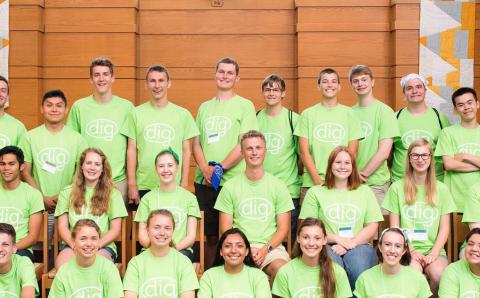As I Was Saying is a forum for a variety of perspectives to foster faith-related conversations among our readers with the goal of mutual learning, even in disagreement. Apart from articles written by editorial staff, these perspectives do not necessarily reflect the views of The Banner.
During a rally for Facebook users last month, Mark Zuckerberg laid out his dreams for the future of his social media behemoth.
As the website reaches 2 billion users, Zuckerberg is turning his attention to the next frontier—building online communities.
In Zuckerberg’s mind, the days of institutions like “churches and Little Leagues” are over. Using Facebook’s new artificial intelligence software, the social media giant can organize its users into groups that will serve the same purpose.
While Zuckerberg missed some important purposes a church community serves, he was right about one thing: Christians are leaving their traditional, brick-and-mortar churches—in droves.
Studies show there are 30 million “dones” in America today. They read their Bibles, listen to Elevation Church’s Steven Furtick podcasts and know every word to every Jesus culture song. They talk about Jesus—a lot, in coffeehouses or at happy hours. But you’ll rarely find them in church.
As someone who has made the agonizing decision to leave a church I loved before, I understand how these people feel overlooked or ignored by Christian leaders. Instead of learning why members are leaving their churches, most congregational leaders continue with business as usual, hoping the missing members eventually come to their senses and return.
The problem is the “dones” aren’t coming back, and their numbers are only increasing. (There are about 7 million “almost dones” right behind them.) And, if the church doesn’t figure out how to create community they are seeking, someone or something else, like Facebook, will do it for them.
Certainly, some of us do not look for community from Facebook. We value face time with our friends. One-on-one real conversations that take time and don’t involve devices or photos but actual being with one another.
In her novel Open House, Elizabeth Berg asks, “Why isn’t there a Community Center for People Who Need a Little Something?
“If people would only tell the truth about the way they felt, it would be busy all the time. There could be folding chairs arranged in groups, people sitting there saying, ‘I don’t know, I just wanted to come here for a while.’”
That’s what the “dones” are looking for. They want church-that’s-not-really-church. They are seeking a place where they don’t have to dress up, where they can ask questions, where people know who they truly are.
They want a place to grapple with the hard stuff, out loud, with others. Face time, not necessarily Facebook. Depth of relationships, depth of study, depth of service. They don’t want to “bowl alone” or stay in “the shallows.” Zuckerberg is right—we are turning to bars, bookstores, or Facebook to find it.
Could this be the New Reformation?
Anglican Bishop Mark Dyer explained that every 400 years, the Christian church undergoes a major transition, led by lay people. Our 400 years are up, and the lay people have spoken by exiting our congregations.
Some time ago, the primary focus of many leaders was to take their churches to the “next level.” In their minds, to be truly successful, they needed bigger facilities, more activities and programs, and more cars in the parking lot. Everything needed to be slick and produced.
Unfortunately, to reach more people, we took Christian community and turned it into a Christian country club. In this modern age, where authenticity is one of the most valued character traits, our churches just aren’t working anymore. We have lost track of being pro-Jesus.
It’s time for a church-wide “yard sale.”
Leaders must take the possessions, procedures, and attitudes that no longer work, box them up, and throw them out. Throw away the clutter that is holding us back: the unnecessary, the unjoyful, the underfunctioning, the no-longer-functioning at all. . . . Toss! Toss! Toss! Get rid of the extras and put our focus back on what matters most—Jesus and relationships.
Mark Zuckerberg recognizes something that so few Christian leaders have. There is an enormous void among believers and a desperate yearning for community. Will we step up and build communities that meet their needs, or will we let Facebook fill that void for us?
© 2017 Religion News Service, used by permission.
About the Author
Andrea Syverson is the author of Alter Girl: Walking Away From Religion Into the Heart of Faith, which will be released Sept. 5









